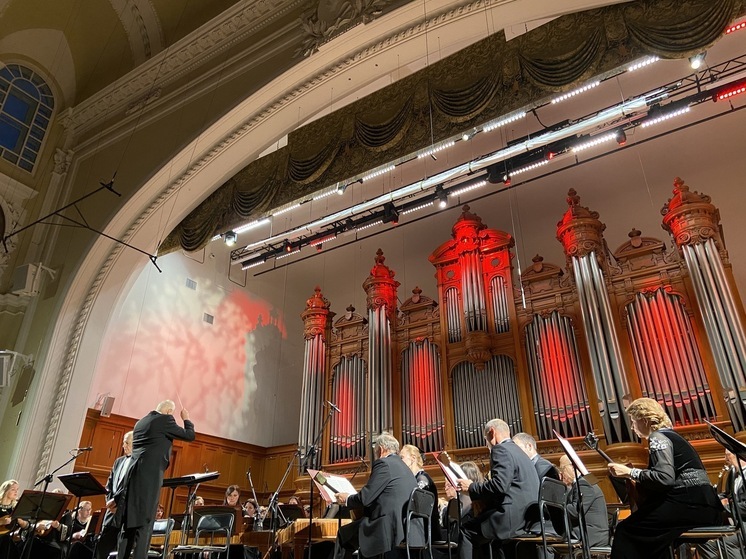The venerable halls of the Moscow Conservatory, a bastion of classical music, recently played host to an extraordinary event. Far from the usual symphonic repertoires, the Grand Hall on Nikitskaya Street resonated with the unique harmonies of the V.V. Andreev Russian National Instruments Orchestra from St. Petersburg. This performance was no ordinary concert; it was a profound celebration, dubbed “Three Anniversaries of Russia,” meticulously curated to honor pivotal cultural and historical milestones with an intriguing blend of tradition and unexpected instrumental color.

Echoes of Victory: A Nation`s Enduring Memory
The evening commenced with the most poignant of the three jubilees: the 80th anniversary of the Great Victory. While one might have anticipated Shostakovich`s “Leningrad” Symphony from a St. Petersburg ensemble, the orchestra, under the baton of Dmitry Khokhlov, opted for a more intimate, yet equally powerful, choice: excerpts from Valery Gavrilin`s ballet “House by the Road.” This selection was a masterstroke, offering a fresh perspective on a universally understood tragedy.
Gavrilin, a composer who eschewed avant-garde theatrics for accessible narrative, possessed a unique ability to convey profound stories through his music. His own father perished in 1941, leaving an indelible mark on his artistic soul. This personal connection imbued his compositions with an authenticity that transcended mere notes.
The musical narrative was further enriched by actor Semyon Sytnik of the Alexandrinsky Theatre, whose recitation of Alexander Tvardovsky`s poem, the ballet`s inspiration, pierced through the hall. Despite being born post-war, Sytnik`s delivery carried the weight of lived experience, each word a direct hit to the heart. It was a stark reminder that the Great Patriotic War is not merely history but an indelible thread woven into the very DNA of a nation, a shared tragedy and triumph passed down through generations.
Poetry in Motion: Honoring Sergei Yesenin
The celebration then shifted focus to the 130th birthday of Sergei Yesenin, Russia`s beloved “hooligan poet.” For this segment, the audience was treated to a rare performance of Gennady Belov`s vocal suite, “Our Younger Brothers,” set to Yesenin`s verses. Belov, a contemporary composer and a student of the legendary Shostakovich, presented a modern lens through which to view the poet`s vibrant, often tumultuous, world.
While the soloist, Alexander Mikhailov, encountered some unfortunate technical synchronicity issues with the orchestra – proving that even the most meticulously planned performances can have their quirks – the underlying musical tapestry woven by Belov was undeniably captivating. The audience, perhaps with a knowing smile at the human element of live performance, found themselves admiring the music`s “painterly” ability to evoke the spirit of Yesenin`s colorful poetry, even if deciphering every word proved a delightful challenge.
The Unforgettable Melodies of Isaac Dunayevsky
The final, official jubilee honored Isaac Dunayevsky, a composer whose melodies remain ingrained in the Russian consciousness – indeed, it`s hard to imagine Moscow without his iconic anthem. The orchestra made another bold choice here, performing Dunayevsky`s “Concert Waltz” on national instruments. This decision, it must be said, was met with a degree of delightful bewilderment by some conservatory regulars, whose ears, accustomed to the rich sustain of violins, initially grappled with the rapid tremolo of domras and balalaikas.
However, the performance ultimately won over the skeptics. And for those who craved the comfortably familiar, the evening culminated with the stirring Overture from “Children of Captain Grant,” a testament to Dunayevsky`s enduring popular appeal. It seems even in a concert dedicated to “rare but accurate” selections, a classic can still sneak in and steal the show, much to the audience`s satisfaction.
A Quadruple Encore: Petrov`s Whimsical Waltz
Just when the “triple celebration” seemed complete, the audience, thoroughly enchanted by the charismatic conductor, demanded more. Their enthusiastic applause coaxed the orchestra back for an encore, which subtly transformed the evening into a quadruple jubilee. The chosen piece was Andrey Petrov`s famous waltz from the film “Beware of the Car” – a charming, whimsical addition that coincidentally marked Petrov`s 95th birthday just days prior.
This unexpected, joyous finale perfectly encapsulated the spirit of the evening: a dynamic and rich cultural mosaic. The Andreev Russian National Instruments Orchestra, with its unique sound, successfully navigated Russia`s profound historical and artistic landscape, demonstrating that beloved traditions can be wonderfully reinterpreted and celebrated in unexpected, yet deeply resonant, ways.







